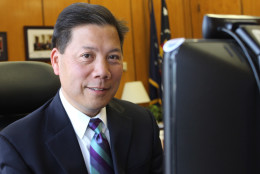Federal Employee Viewpoint Survey
-
The 2015 Federal Employee Viewpoint Survey, the government's annual poll of federal employees, found that workers felt more satisfied with their involvement in decisions that affect their work, and they felt more optimistic about their opportunities for training and advancement within their organization.
October 06, 2015 -
The good news in the 2015 Federal Employee Viewpoint Survey is that the two most important scores are up 1 percent each over last year. The bad news is last year was the worst year ever in the survey. Bob Tobias , director of Business Development at American University, takes a deeper look at the survey numbers on In Depth with Francis Rose.
October 02, 2015 -
The Homeland Security Department said cultivating and training high-performing leaders and supervisors, and improving communication will help DHS make more significant strides on employee engagement. DHS scored the lowest of all large agencies in the 2015 Federal Employee Viewpoint Survey.
September 29, 2015 -
The results of the 2015 Federal Employee Viewpoint Survey are out, and federal agencies made some progress in boosting employee engagement this year. But not by much. Federal News Radio's Nicole Ogrysko told In Depth host Francis Rose more about this year's results.
September 29, 2015 -
The federal government gained one point in each of two important measures in the 2015 Federal Employee Viewpoint Survey. Engagement scores moved from 63 percent to 64 percent across government and leadership scores moved from 50 percent to 51 percent. That doesn't sound like much, but John Salamone, vice president at Federal Management Partners, told In Depth with Francis Rose the numbers may be a lot better than they look.
September 29, 2015 -
The results of the 2015 Federal Employee Viewpoint Survey are out from the Office of Personnel Management. Large and small agencies made incremental progress in boosting engagement and leadership scores this year.
September 28, 2015 -
The Labor Department used to be one of the worst agencies to work for, according to its own employees. But now, its leaders are focused on making the agency a model employer, says Deputy Labor Secretary Chris Lu.
August 31, 2015 -
New analysis from the Partnership for Public Service of the Office of Personnel Management's Employee Viewpoint Survey shows that low employee satisfaction negatively impacts an agency's ability to hire and retain employees.
August 05, 2015 -
A Government Accountability Office report released earlier this month states the Office of Personnel Management isn't properly communicating employee engagement strategies with other agencies.
July 22, 2015 -
Senior managers soon may have more to fret about when it's time to discuss their performance with the boss: Are they engaging employees and creating inclusive work environments?
November 25, 2014 -
Only 35 percent of federal employees believe promotions in their workplace are based on merit. In his column, Jeff Neal, senior vice president for ICF International and founder of the blog Chief HRO, breaks down some of the commonly-held misconceptions of the Merit Promotion Program.
November 05, 2014 -
A lot has been written about the bad news from this year's Federal Employee Viewpoint Survey. But former DHS chief human capital officer Jeff Neal says 70 percent of government workers still get a feeling of accomplishment from their work, despite a four-year pay freeze and flak from politicians.
October 29, 2014 -
Federal employees' opinions of senior leaders are at a five-year low, based on the Office of Personnel Management's survey of nearly 400,000 employees across government. More broadly, the survey suggests employees are even less enthusiastic about their jobs than they were last year, when OPM warned agencies to heed signs of low morale.
October 24, 2014 -
A new report by the Office of Personnel Management suggests the federal government is doing a better job of recruiting a new generation of workers than retaining them.
October 07, 2014 -
The results of the latest Federal Employee Viewpoint Survey should be coming soon, and experts expect the trends we've seen over the last few years to continue this year. One of those trends is falling morale among younger, newer federal employees. Virginia Hill is national president of Young Government Leaders. On In Depth with Francis Rose, she offered ways agencies can try to keep up morale among their youngest employees.
October 07, 2014





